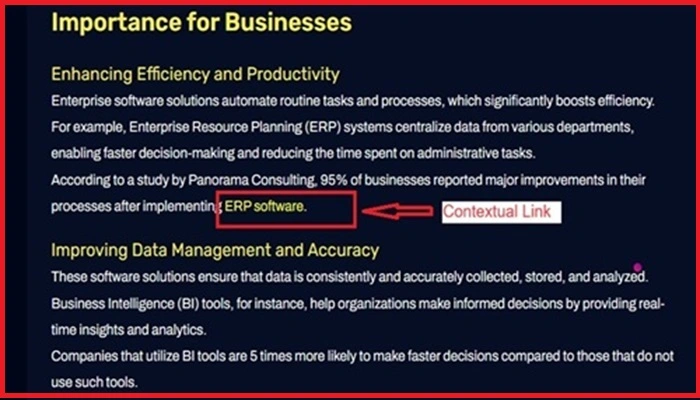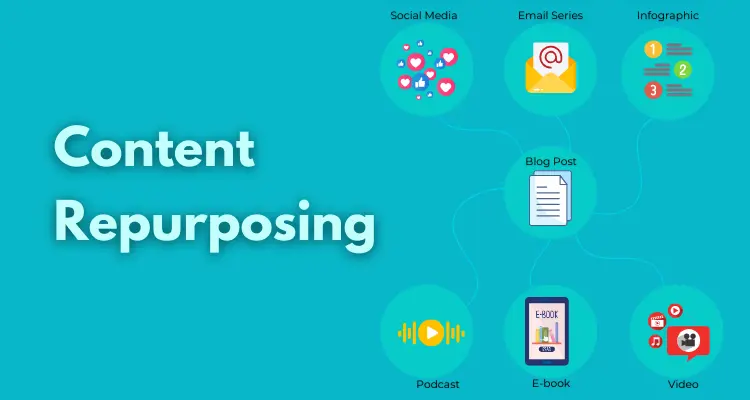- Home
- -Blog
Advanced Techniques for Acquiring Contextual Links

- 05 August 2024
- Shabir Ahmad
Backlinks are crucial for enhancing the SEO of your website and for getting better rankings on the search engine result pages. The most important type of links is the contextual ones or the links that are placed within the text naturally as they are both relevant and authoritative.

Such high-quality backlinks are highly appreciated by the search engines like Google because they are useful and provide context to the content. It is crucial to know and apply sophisticated methods of obtaining contextual links to improve your SEO plan.
In this blog we will discuss some of the advanced methods of getting these highly effective contextual links.
1. Content Repurposing
Content repurposing is the process of converting the existing content into other forms to reach out to more people and get more backlinks. For instance you can repurpose a highly performing blog post into an infographic video or podcast.

Steps to Repurpose Content:
- Identify High-Performing Content: Begin with the selection of the posts or articles that have already received a lot of traffic or comments.
- Choose New Formats: Determine new formats for the content. This could include developing infographics videos podcasts or power point presentations.
- Create the New Content: For instance use Canva for infographics Adobe Premiere for videos or Audacity for podcasts to create high-quality repurposed content.
- Promote the Repurposed Content: Post the new content on social media YouTube SlideShare or other blogs and forums that are related to the topic.
Benefits of Repurposing Content for Contextual Link Building:
Repurposing content means that you are targeting different segments of the audience which means that the probability of getting backlinks is higher. It also enables you to get the most out of your existing content without having to come up with new content all over again.2. Influencer Collaborations
Influencers have gained trust and a significant number of followers within particular categories. Working with them can assist you in getting quality backlinks from such sites.
Methods to Collaborate with Influencers:
- Guest Blogging: Propose to create content for the influencers' blogs as a guest blogger. Make sure the content is useful and pertinent to the target audience.
- Co-Authored Articles: Write articles that can be posted on your site and the site of the influencer.
- Joint Webinars and Podcasts: Host webinars or podcasts with influencers to expand the audience and get backlinks.
- Social Media Promotions: Cross-promote each other's content by collaborating with influencers on social media platforms.
How Collaborations Lead to High-Quality Contextual Links:
Influencers usually have high domain authority sites and links from their content can greatly improve your site’s ranking. Also their endorsement makes your content more credible to the audience.3. Data-Driven Outreach
Outreach based on data means that one has to search for websites that would be interested in linking to your content using tools and research. Sites that can be potentially targeted can be found using tools such as Ahrefs SEMrush and Moz.
Tools and Techniques for Conducting Data-Driven Outreach:
- Backlink Analysis Tools: Backlink analysis can be done using tools such as Ahrefs to determine the linking opportunities of the competitors. Additionally, implementing effective techniques to improve team collaboration can enhance communication and streamline the link-building process for better results.
- Content Gap Analysis: Find out what content is missing in your niche and produce content that is missing.
- Email Outreach Campaigns: Use tools like Clearout to find contact information and Hunter.io to send personalized outreach emails.
Case studies have shown that personalized data-driven outreach campaigns can have a high success rate. For instance personalized outreach emails that mention specific content on the recipient's site are more likely to be successful.
4. Guest Blogging
Guest blogging is one of the most effective ways to get backlinks. This way you can get backlinks to your own site when you write quality content for other sites.

Tips for Guest Posts:
- Research High-Authority Sites: Use tools like Moz's Domain Authority to find high-authority sites in your niche.
- Check for Engagement: Ensure the site has an engaged audience by checking the comments and social shares on their posts.
- Pitch Relevant Topics: Pitch topics that are relevant to the site's audience and align with their content strategy.
- Create Value: Write comprehensive and valuable content that addresses the audience's needs.
- Use Internal Links: Include internal links to your own site within the content.
- Promote the Post: Once published promote the guest post through your own channels to drive traffic and engagement.
5. Broken Link Building
Broken link building involves finding broken links on other websites and suggesting your content as a replacement. This not only helps the website owner fix broken links but also provides you with valuable backlinks.

Steps to Find Broken Links on Relevant Websites:
- Use SEO Tools: Tools like Ahrefs or SEMrush can help identify broken links on high-authority sites.
- Check Competitor Sites: Analyze competitors' sites for broken links and opportunities to replace them with your content.
- Create Replacement Content: Ensure you have relevant content that can serve as a replacement for the broken link.
How to Pitch Your Content as a Replacement for Broken Links:
- Contact the Website Owner: Reach out to the website owner or webmaster and inform them about the broken link.
- Suggest Your Content: Politely suggest your content as a suitable replacement explaining how it adds value to their readers.
- Follow-up: If you don't get a response follow up after a week to increase your chances of success.
6. Creating Link-Worthy Content
Certain types of content are more likely to attract backlinks. These include in-depth guides case studies research reports and infographics.
Strategies for Creating High-Quality Link-Worthy Content:
- Conduct Thorough Research: Use data and research to create comprehensive content.
- Focus on Quality: Ensure your content is well-written accurate and valuable to your audience.
- Use Visuals: Include images infographics and videos to make your content more engaging.
- Update Regularly: Keep your content updated to ensure it remains relevant and valuable.
In-depth guides and comprehensive articles that address common problems or provide detailed information tend to attract a lot of backlinks.
7. Leveraging Social Media
Social media platforms can be powerful tools for promoting your content and attracting backlinks.
Strategies for Engaging with Your Audience on Social Media:
- Share Content Regularly: Post your content on social media platforms regularly.
- Engage with Followers: Respond to comments and engage with your followers to build a community.
- Join Relevant Groups: Participate in relevant groups and forums to share your content and engage with potential linkers.
By engaging with your audience and sharing valuable content you increase the chances of your content being shared and linked to by others.
8. Content Syndication
Content syndication involves publishing your content on third-party sites to reach a broader audience and gain backlinks.
Finding Syndication Partners in Your Niche:
- Identify Reputable Sites: Look for reputable sites in your niche that accept syndicated content.
- Pitch Your Content: Reach out to these sites and pitch your content for syndication.
- Ensure Proper Attribution: Make sure that the syndicated content includes a link back to the original post on your site.
How to Syndicate Content Effectively to Gain Contextual Links:
- Create High-Quality Content: Ensure your content is valuable and relevant.
- Choose the Right Partners: Syndicate your content on sites that have a high domain authority and a relevant audience.
- Track Performance: Use tools like Google Analytics to track the performance of your syndicated content and the backlinks it generates.
9. Resource Page Link Building
Resource pages are dedicated sections on websites that list valuable resources and links related to a specific topic. These pages are excellent opportunities for acquiring high-quality backlinks because they are typically maintained by authoritative sites.
How to Identify Relevant Resource Pages:
- Use Specific Search Queries: Utilize search engines with queries like “your keyword + resources” “your keyword + useful links” or “your keyword + resource page.”
- Analyze Competitor Backlinks: Use tools like Ahrefs or Moz to see if your competitors are listed on any resource pages. This can help you find potential resource pages to target.
- Browse Industry Websites: Regularly visit authoritative sites in your industry to check for resource pages.
How to Get Your Content Featured on These Pages:
- Create High-Quality Resources: Ensure that your content is valuable comprehensive and relevant to the resource page's topic.
- Reach Out to Webmasters: Contact the webmasters or site owners of the resource pages. Introduce yourself explain why your content would be a valuable addition and provide a direct link to your resource.
- Personalize Your Outreach: Customize your outreach emails to show that you've reviewed their page and understand its purpose. Use an email verifier to ensure deliverability, and mention specific points about their site to make your request more genuine.
- Follow Up: If you don't receive a response follow up after a week or two. Polite persistence can sometimes make the difference.
Benefits of Resource Page Link Building for Contextual Links:
- High-Quality Backlinks: Resource pages often belong to reputable sites with high domain authority which can significantly boost your SEO.
- Relevant Traffic: Being listed on a resource page can drive targeted traffic to your site as visitors are actively seeking information on that topic.
- Enhanced Credibility: Getting featured on a well-respected resource page can enhance your site's credibility and reputation within your industry.
10. Participating in Online Communities
Engaging with online communities is a great way to build relationships share knowledge and gain valuable backlinks. These communities include forums Q&A sites like Quora and industry-specific groups on platforms like LinkedIn and Reddit.

How to Engage with Online Communities:
- Join Relevant Groups: Identify and join groups or forums that are relevant to your industry. Participate in discussions and contribute meaningful insights.
- Answer Questions: On Q&A sites provide detailed answers to questions related to your expertise. Include links to your content where appropriate ensuring it adds value to the discussion.
- Share Valuable Content: Regularly share your content in these communities. Ensure it is relevant and provides value to the members.
Sharing Valuable Content and Insights to Build Relationships:
- Be Consistent: Regular participation helps you build a reputation as a knowledgeable and reliable member of the community.
- Provide Help: Focus on helping others rather than just promoting your content. Genuine assistance often leads to natural backlinks.
- Network: Engage with other members build relationships and collaborate on content or projects that can result in mutual linking opportunities.
How Participation in These Communities Can Lead to Contextual Links:
- Natural Backlinks: As you build credibility other members are more likely to link to your content in their discussions or articles.
- Guest Posting Opportunities: Building relationships within these communities can lead to guest posting opportunities on members' blogs or websites.
- Increased Visibility: Active participation increases your visibility leading to more shares and mentions of your content.
Conclusion
Building a strong backlink profile through contextual links is a powerful strategy to enhance your SEO and improve search engine rankings. By implementing these advanced techniques you can acquire high-quality backlinks that boost your site's authority and relevance.
These methods not only help you gain valuable backlinks but also drive targeted traffic to your site and enhance your online reputation. Consistent effort and a focus on creating valuable relevant content are key to successful contextual link building.Additionally, these strategies can help you secure permanent backlinks, ensuring long-term benefits for your website's SEO.



